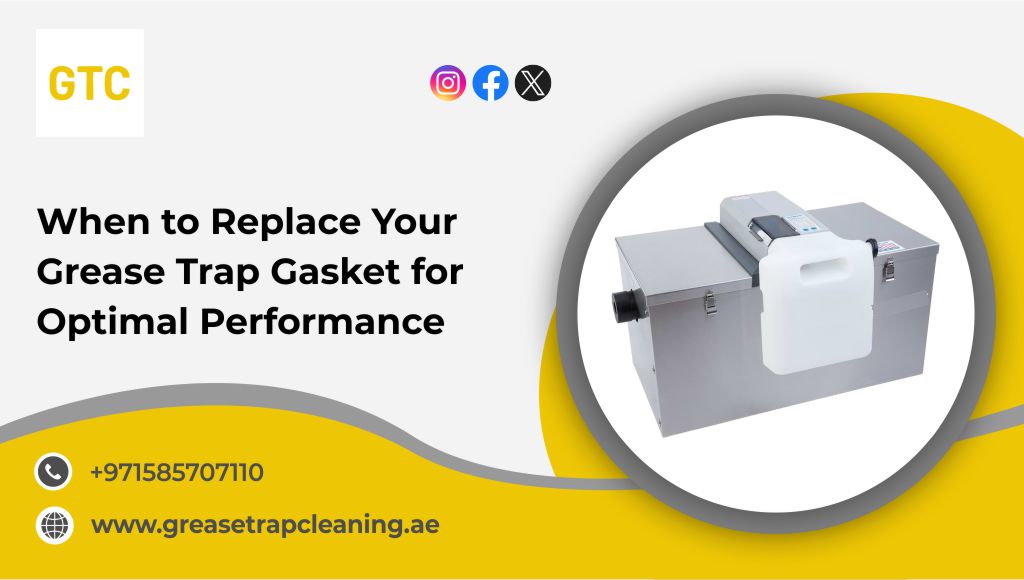Grease traps are essential in commercial kitchens, preventing grease, fats, and oils from entering the plumbing system and causing blockages. Proper maintenance of these traps is crucial for their efficient functioning, and one often overlooked aspect is the condition of the grease trap gasket. In this blog, we’ll delve into the importance of the grease trap gasket, signs indicating the need for replacement, and how timely replacement can optimize your grease trap’s performance.
What is a Grease Trap Gasket?
The grease trap gasket plays a pivotal role in sealing the connections between various components of the grease trap system. It ensures no leaks, preventing grease and foul odors from escaping into the surrounding environment. Typically made of rubber or silicone, these gaskets provide a tight seal, maintaining the integrity of the grease trap.
This seal prevents three main issues:
- Leaks: A faulty gasket can allow wastewater, grease, and unpleasant odors to escape the trap. It can create a mess in your kitchen, attract pests, and potentially violate health codes.
- Inefficiency: Leaks also allow untreated wastewater to bypass the grease separation process. It means more FOG enters the sewer system, increasing the risk of clogs and backups.
- Solid Intrusion: A broken seal can allow debris and solids to enter the grease trap, interfering with its operation and potentially requiring additional pumping.
Signs It’s Time for Replacement
- Visible Wear and Tear: Regularly inspect the gasket for signs of deterioration, such as cracks, tears, or distortion. Over time, exposure to grease, heat, and chemicals can cause the gasket material to degrade, compromising its effectiveness.
- Leakage: If you notice grease or water leaking from the grease trap connections, it’s likely due to a faulty gasket. Even minor leaks can escalate into significant issues, leading to contamination and potential damage to surrounding structures.
- Foul Odors: A deteriorating gasket can allow foul odors to escape from the grease trap. If you smell unpleasant odors emanating from the vicinity of the grease trap, it may indicate a compromised gasket seal.
- Reduced Efficiency: An inefficient grease trap can decrease performance, leading to clogs in the plumbing system and increased maintenance costs. If you observe a decline in the effectiveness of your grease trap, the gasket could be a contributing factor.
- Loose Lid: An adequately sealed lid shouldn’t be easy to open. If the lid appears loose or wobbly, it could indicate a compromised gasket.
Importance of Timely Replacement
Replacing the grease trap gasket at the right time is crucial for maintaining optimal performance and preventing costly repairs. Ignoring signs of gasket wear can lead to more significant issues down the line, including:
- Health and Safety Risks: Leaking grease traps can create hazardous conditions, posing health risks to employees and patrons. Moreover, grease buildup can increase the fire risk, jeopardizing your establishment’s safety.
- Environmental Impact: Escaping grease and contaminants can pollute water sources and disrupt ecosystems, harming the environment. Ensuring a tight seal with a properly functioning gasket contributes to environmental preservation efforts.
- Compliance Concerns: Regulators can fine companies that fail to maintain grease traps. Compliance with local ordinances and health codes is essential for businesses in the food service industry, and regularly replacing gaskets is part of this obligation.
Grease Trap Plumber Assistance
- Expertise and Experience: Grease trap plumbers possess specialized knowledge and extensive experience in grease trap systems.
- Comprehensive Inspection: They conduct meticulously thorough inspections to assess the condition of gaskets and overall system health.
- Professional Recommendations: Based on their assessment, they provide informed advice on repair or replacement options, considering factors like longevity and cost-effectiveness.
- Efficient Service and Quality Workmanship: Grease trap plumbers execute repairs or replacements efficiently, using high-quality materials and adhering to industry standards for optimal performance.
- Compliance Assurance and Regulatory Expertise: They ensure compliance with local regulations and standards, guiding clients through necessary documentation and record-keeping.
- Emergency Response and Timely Assistance: In emergencies, these professionals offer rapid response and practical solutions to minimize disruptions to business operations.
- Long-Term Support and Maintenance: Establishing a partnership with a grease trap plumber ensures ongoing maintenance, proactive inspections, and reliable support to maximize your grease trap system’s lifespan and efficiency.
Consider the Aluline Grease Trap as an Alternative
Traditional grease traps with gaskets require regular maintenance and gasket replacements, but innovative alternatives are available. The Aluline Grease Trap alternative is an interceptor made from lightweight, high-density polyethylene (HDPE). Here’s why aluline might be a good fit for your commercial kitchen:
- Durable Construction: HDPE is known for its strength and chemical resistance. The durability of Aluline grease traps eliminates the need for frequent gasket replacements and the associated costs.
- Simplified Maintenance: Aluline traps feature a unique baffle system that separates FOG from wastewater. Compared to traditional traps, this design simplifies cleaning and reduces the frequency of pumping required. The smooth interior surfaces of aluline traps make them easier to clean, minimizing the risk of caked-on FOG that can harbor bacteria.
- Lightweight Design: Aluline traps are significantly lighter than traditional concrete traps, making them easier to install and maintain. It is beneficial when replacing or remodeling.
Partner with Grease Trap Plumber for a Smooth Function in the Kitchen!
A properly sealed and well-maintained grease trap is vital for maintaining a clean, efficient kitchen operation. By keeping an eye on your grease trap gasket and scheduling regular maintenance with a licensed grease trap plumber, you can ensure your trap functions optimally and prevent costly backups and violations. If you’re looking for a long-term solution that minimizes maintenance needs and downtime, consider exploring the Aluline Grease Traps alternative. Remember, a well-maintained grease trap benefits your business and the environment by preventing FOG from entering the sewer system. To learn more about the products and maintenance charges, contact Grease Trap Cleaning.
